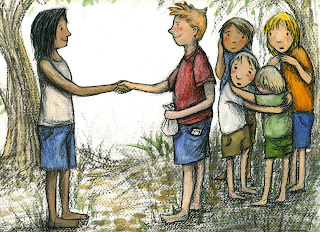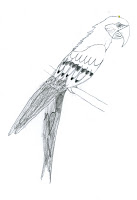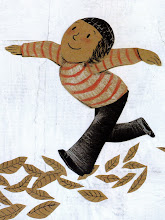 This is the story I wrote for The Age last summer, which became the inspiration for my children's novel "Angel Creek". I have been working on "Angel Creek" all year, and next week I will hold a finished copy in my hands. For such a small book, it has had a long history.
This is the story I wrote for The Age last summer, which became the inspiration for my children's novel "Angel Creek". I have been working on "Angel Creek" all year, and next week I will hold a finished copy in my hands. For such a small book, it has had a long history.Last Night Down by the Merri Creek
Pik, Gino and I climb over my back fence and shimmy down the bank towards the Merri Creek. It’s Christmas Eve. This year we’ve had rain and the creek is flowing fast, and all the rubbish from the city is pushed up onto the banks or caught up in the reeds.
Gino’s the first to take off his shoes. ‘Look at all this junk,’ he calls. ‘Bet there’s some cool stuff here.’ He walks along the riverbank lifting up tangles of plastic and string with the end of his stick. There’s a road bridge up ahead and the streetlamps light up the path. Not under the bridge though. At night the tunnel yawns blackly like the mouth of a beast.
‘Hey, let’s go in,’ Gino dares.
‘Cool,’ Pik says, but I can see he doesn’t want to. Me neither, but I’m not going to let them think I’m scared just coz I’m a girl.
We follow Gino along the bank towards the tunnel. A car clacks across the bridge but otherwise there’s no one around. Over the noise of the cicadas we can still hear our parents in my backyard, laughing loud and silly.
At the mouth of the tunnel, Pik and I hesitate as we watch Gino swallowed up by the dark. But then his voice calls out, ‘Not scared are ya?’ and I grab Pik’s hand and pull him in behind me.
After a while I can make out Gino’s form crouching by the water. He turns and beckons to us, then puts his finger on his lips for us to be quiet.
‘What is it?’ I whisper.
‘Dunno. Some bird, I think. Caught up in the rubbish.’
‘Don’t scare it,’ I say. ‘Maybe we can get it out?’
‘Gimme your stick,’ Gino says.
I hand Gino the stick and crouch down by the water’s edge to watch. Pik crouches next to me. I can hear his breathing.
Gino leans out across the water and hooks the end of the stick under a pale-coloured wing. It’s huge. I know all the birds that hang around the creek and I’ve never seen a wing that big. The bird flaps frantically and the three of us fall back onto our bums, laughing nervously. I’m trying not to laugh too loud coz I’m worried about that poor bird. I’m hoping we can save it.
‘Maybe we should get Dad to help?’ I say. ‘Or wait till tomorrow?’
‘It’ll be dead by tomorrow,’ Gino says. ‘Come on.’ He begins to wade out into the water. The creek is flowing fast and I know that I am breaking every rule my parents have ever given me by letting this happen. I look at Pik before I step into the icy water and see the whites of his eyes in the dark. Mud oozes up through my toes as I wade out after him. Gino is close to the bird now, which seems to be trapped behind a rock. As I approach, he bends down to study it. Suddenly, he reels back, arms like windmills. ‘Oh my god!’ he gasps. ‘It’s not a bird!’
I feel my heart thump about wildly in my chest. I don’t want to believe him but something in his voice has turned my skin cold. I peer over the stone into the rushing water and in the shadowy depths I see the pale, pale face of a young boy staring up at us. His eyes are like glass.
‘I’m getting Dad,’ Gino says. He is already striding back through the water and I hear the fear snag his voice. On the bank, Pik starts to bawl. I can’t take my eyes off the boy’s face. I know I should feel frightened but somehow I can’t turn away.
‘Get my dad, too,’ I say. ‘I’ll stay here. Hurry!’
I hear the squelch of their feet as Gino and Pik leave the tunnel and run back along the creek. I turn away from the boy’s face to examine the tangled wing. Something is not making sense. Then, I understand. I call out to Gino and Pik but they are already too far away and my voice ricochets around the tunnel over the noise of the rushing water.
The angel looks up at me with frightened eyes. I perch on the rock to steady myself and try to unwrap some of the rubbish caught around the wing. But when I pull at the plastic, his other wing comes thrashing out of the water. I let go. ‘Hey,’ I say softly. ‘Keep still. I’m trying to help you.’ I stroke his feathers and the angel stares back at me, his peaked chest palpitating like a frightened bird.
Looking more closely I see that one end of the plastic is caught around the rock. I take hold of it and unwind it carefully, my hands dipping in and out of the creek. The angel keeps still, looking up at me through the murky water, its eyes bright and wild. There is only one last piece to go and the angel will be free.
The water in front of me rears up, there is a flash of light and for an instant I am blinded. I hear a whoosh of wings and he is gone. In the distance I hear the voices of my dad and the others running towards the tunnel as a single white feather spins slowly down into my lap.
They never believe my story. Not Mum, not Dad, not even Gino and Pik. But I still have that feather. And no one’s ever found a bird that matches it.






















